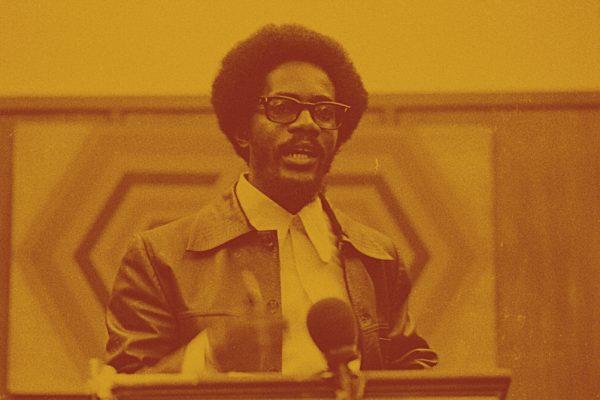Four General Values Fallen into Crisis
In today’s Taiwan the gap between rich and poor has widened precipitously, the “misery index” has shot up, the war clouds over the Taiwan Straits refuse to disperse, the curse of the unity–independence split will not go away, there is a lack of sense of direction on the part of society as a whole, and the majority of the population feels powerless—yet the Blue and Green camps1 remain intoxicated in their bitter struggle for power. The street talk and intensive activity that hover over this impasse are heard virtually everywhere, but because they lack an appropriate means of expression, they get trapped in the discursive conventions of the impasse itself—that is, in the language of the Blue–Green power struggle. On the surface the Blues and the Greens are engaged in a clamorous antagonism, but under the table they are playing the same game—it is a mutual opposition based on a vexatious predicament, which is how to invigorate a largely powerless public. In the process of carefully examining this urgent predicament, we have determined four key general values that are in deep crisis: social justice, the common political realm, equality of [ethnic] identity, and cross-straits peace. The predicament having been thus created, our only goal for the moment must be to the fullest extent possible to seek out its roots and find ways to transcend and overcome it. The new political regime that came to power in 2000 must take a good deal of responsibility for the present state of affairs, something implicit in the notion of responsible party government itself. The new political regime, however, is not an historical accident, but an organic part of the history of Taiwan and the [East Asian] region over the past 50 years. Because of this, to break out of the current predicament, we must place the new regime in the context of a long discourse of opposition under an authoritarian structure of power.
An Anti-Democratic Notion of “A Mature Democracy”
From the time of the “non-party”[movement] of the early 1970s on,2 the core of the oppositional discourse was to “use a nativist democratic movement to oppose an externally imposed Kuomintang authoritarian regime.”After the “party shift” of March 2000, this democratic movement produced ageneral consensus on the notion of “a mature democracy”: since the external political regime had stepped down, the ultimate achievement of democracy was no longer in question. This consensus revealed a previously undeclared feature of the discourse of the “non-party” opposition: democratization was dependent upon nativization; it did not constitute an independent entity in itself and even lacked any value in itself worthy of the name.
This concept of “a mature democracy” signaled, in fact, the end of democracy in substance. The new regime that at the same time actively broadcast this consensus and passively inherited it was its actual beneficiary—it used the consensus to legitimate itself. But the regime was similarly the victim of this consensus—self-satisfied in the illusion of the achievement of democracy, it abruptly forsook its ideals (consider for a moment the abandonment and helplessness of various social movements under the new regime). The idea of “amature democracy,” having reached the position of hegemonic discourse, now more often than not serves merely to bewilder the population. On the one hand, do not the media, politicians, and scholars all say that we have left authoritarianism behind and become a democracy? On the other hand, however, from any perspective the social reality on view is chaotic, hollow, and substantially unfair. Under the giant inscription of “democracy,” society’s actual face is indistinct and disordered amid a confusing din of voices.
The Price of “Democratization Based on Provincial Identity”
The root of the problem lies in Taiwan’s unique “democratization based on provincial identity.” In the 30 years since the inception of the non-party movement in the ’70s of the last century, the nativist democracy movement took a shortcut: by means of a popular mobilization based on provincial identification, it managed to replace the old regime. It did not, however, choose the more arduous, slower path of “enlightenment” and popular education built upon the process of a public discourse of the citizenry. Of course, choosing the “provincial path” arose of out certain unavoidable historical conditions, and it did have its unique achievements. So while we should sympathetically understand the movement, this understanding should not prevent us from reflecting upon its huge price, a price that has been the long-term listlessness and immaturity of the Taiwanese political public sphere. Since neither the citizen body nor the public sphere was opened up, the only option left to the political realm was scheming for power and bitter fighting—all clinging to the axis of provincial originand national identity, spiraling down to a bitter end. Although we refer to them as two parties, politics never veered from a strictly self-interested course, characterized by a battle to the death between irreconcilable foes (that is, between opposing communities). In such circumstances rational debate, public discussion, cooperation, even political dispute along a left–right political spectrum were all impossible. The abolition of the Garrison Command3 and the power of the Strongman were great achievements of the movement for democracy in Taiwan, but they were still not enough to bring into being a political public sphere—the only touchstone of true democracy.
Three Periods of Authoritarianism Before Post-Authoritarianism
The situation today can only be characterized as post-authoritarian. It is not the antithesis of the authoritarian period, much less does it transcend that period. In order to fully understand our times, they must be put in the context of the history of the structure of authoritarianism on this island and clearly set against the numerous continuities and fractures with the various periods of authoritarianism that came before. Prior to post-authoritarianism we had a period of classic authoritarianism (Chiang Kai-shek), one of reform authoritarianism (Chiang Ching-guo), and one of populist authoritarianism (Lee Teng-hui). If we use the four norms of social justice, cross-straits peace, a common political realm, and equality of [ethnic] identity as a baseline from which to understand the relationship between post-authoritarian times and the three preceding periods of authoritarianism, then post-authoritarianism not only does not represent relative progress, but in many important respects is seriously retrograde. Since our space here is limited, let us say very roughly that the post-authoritarian period not only inherited certain ones of the backward and reactionary features of authoritarianism, but also shrank or abandoned the few relatively progressive attributes of the authoritarian period. History must be regarded dialectically and the devil given his due. In the eras of Chiang Kai-shek’s classic authoritarianism and Chiang Ching-kuo’s reform authoritarianism, politics took precedence over private capital, the state had a leadership position in and power over economic development, and national policies—considerations of motive left aside—such as public education, public health, and basic labor law had the effect of maintaining basic social equity. In regard to cross-straits peace, the regime of Chiang Ching-kuo, even burdened as it was by its anti-communist legacy, still sought to break out of the Cold War framework and gradually thaw out the antagonistic cross-straits relations that had endured for so many years; at one point it even seemed as if there were hope for bringing peace both to the straits and to the region as a whole. The populist authoritarianism that came into being in 1993 reactivated communal divisions, rendered cross-straits relations more tense, stifled the movement for social autonomy, actively tilted in the direction of big capital and, in a bizarre political move, began to reprivatize [public assets] in the name of the people. In spite of this, however, if one once again leaves motives aside, this system was able to bring into being the great contribution toward social justice of comprehensive health insurance.
The Regressions of Post-Authoritarianism
From this perspective, the new regime resulting from the change of political parties in March 2000 was not really new: it carried on the exclusionist communal politics of the previous authoritarian systems, narrowed the public sphere through its populism and made cross-straits hostility the norm. It was new, at least, in scrapping a number of relatively progressive values and institutions. In the three years since 2000, we have seen national tax and development policies that even more openly favor the rich at the expense of the poor—the great concentrations of capital have satiated themselves on all sorts of preferences and exemptions while ordinary people have borne a heavy burden of taxation. The regime has initiated a discourse of education as the realm of private investment, and even the health-insurance program set up during the period of populist authoritarianism has repeatedly been shrunk in the name of the euphemistically named “health-insurance reform.” The only positive achievement of post-authoritarianism has been there treat of Strongman politics to a place beyond the horizon. The true measure of the actual nature of our post-authoritarianism, however, has yet to be determined, but let us repeat once again that the standards of evaluation must in the end be social justice, the common political realm, equality of [ethnic] identity, and cross-straits peace. If there is no substantial progress, then the population living under post-authoritarianism may not even be able to resist the temptations of authoritarianism and end up retreating back towards an end to post-authoritarianism. The repeated summoning of the image of “Mr. Ching-kuo” of late can perhaps be understood as a manifestation of this.
Relations of People Across the Straits
If we want to overcome the hollow values, the substantial inequality and the potential for the restoration of authoritarianism in our post-authoritarian situation, we must move beyond the negative achievement of a democratization based on provincial identity to actively democratizing and expanding the sense of the public. The sense of the public—that is to say discourse, activity, and intervention [in politics] on the part of the majority of the population that is sustained and thorough going—is the result of a long process of learning and struggle. It is, however, only by relying on this that we can get beyond the mire of the nasty struggle between the Blue and Green camps and locate the inspiration we need to find a new direction. But this work of public reconstruction has a crucial knot that needs to be unraveled, and that is relations between the peoples on both sides of the Taiwan Straits. Our point here is simple: in some essential way democracy on the island is an extension of the relationship of the peoples on both sides of the straits. This is because if Taiwanese society locks up popular energy in a perpetual state of readiness against an “external enemy,” then authoritarian politics will eventually become an inseparable companion. In the context of populism, a politics of the public cannot develop, and any discussion of social justice or cross-straitspeace will be displaced into a struggle over independence vs. unification.
The Four Goals of a Democratic Left
“Moving toward a public sphere and overcoming post-authoritarianism” is a plan of the democratic left that incorporates the four great goals of peace for people on both sides of the straits: a common political realm, equality across a number of possible social identities, and a sense of social justice. In calling for democracy, we emphasize our refusal of the seductions of any version of authoritarianism and our belief in and support of the ability of ordinary people to develop political subjectivity in the process of daily life. In stressing our leftism, we are expressing our refusal of any exploitation, oppression, or discrimination; our challenge of the myth of the market, of merely formulaic democracy, and of all sorts of cultural hegemony; our pursuit of social justice and individual liberation; and our capacity to take historical initiative. Today, as Blue-Green mainstream politics have joined hands to draw the political map of Taiwan and to monopolize and stifle its capacity for political imagination, our plan for a democratic left must from any perspective stand as a counter-proposition to the vulgarity, hyperbole, contortions, and corruption of the political mainstream. The democratic left under no circumstances stands in opposition to the Blue-Green mainstream but represents rather the transcendence and defeat of that sort of politics; it does not wish to compete for power against them but rather to eliminate this sort of contest for power; it does not seek to compete with them for popular support but to create a discourse in support of the people and that will transform the people. We call upon all those individuals and groups—including ourselves—who retain faith in these goals to cast off our depression and sense of impotence and learn to play our public roles. In this way we can discuss the implementation in this time and this place of such values as justice, equality, diversity, and freedom, overcome post-authoritarianism, and create history. This is where the real contribution of the experience of Taiwanese democratization to human civilization will lie.
Notes
1) The colors of the Kuomintang–People First Party and the Democratic Progressive Party of Chen Shui-pien respectively.
2) The name for the Taiwanese opposition in the days of the Kuomintang dictatorship.
3) The Garrison Command headed the constabulary responsible for enforcing the martial law that was in force between 1949 and 1987.
TRANSLATOR’S NOTE
While little-reported in the Western media, political and military tension in East Asia has mounted palpably over the course of 2004. Much of this increasing tension stems from the March 20 presidential election in Taiwan, in which the incumbent president Chen Shui-bian, of the Democratic Progressive Party, a party historically rooted in its commitment to independence from China, was re-elected by the narrowest of margins. This result, complicated by a mysterious assassination attempt on Chen the day before the election, confounded all the pre-election polls. More ominously, the result also thwarted confident expectations in Beijing that the current incarnation of the Kuomintang Party—the Kuomintang Party–People First Party alliance—with its less obdurate stand on the question of moving Taiwan away from unification with the mainland, would be returned to office. As spring became summer, sharp statements from all sides (including hints of intervention in Taiwan’s defense from Japan and the United States) combined with substantial military maneuvers by China, Taiwan, and the United States to roil already troubled waters in the western Pacific.
The essay printed here, originally titled “Moving Toward an Idea of the Public; Transcending Post-Authoritarianism,” first appeared on October 3, 2003—long before the onset of the present crisis—in the China Times (Zhongguoshibao), arguably the best newspaper in the Chinese-speaking world.In the wake of the election, it was reprinted in Reading (Dushu), the most important journal of intellectual opinion in China. The statement is based on a much longer analytical essay written by the editors of Taiwan: A Radical Quarterly in Social Studies, a journal founded in 1988—just after the end of martial law in Taiwan—by a group of engaged scholars and activists devoted to the study of Taiwan’s long-term development and position in the world. The collective statement, offering a social critique from the perspective of the democratic left, took stock of recent political history in Taiwan and the prospects for the future on the 15th anniversary of the founding of the journal.
It is impossible to include in this shorter version the detailed research that underlies many of the claims made here about recent trends in Taiwanese society. But the most important of the group’s arguments stands out in high relief: that the major political parties’ attempts over the past decade to create an exclusive ethnic consciousness among Taiwan’s various linguistic communities has led to a social and political dead end. In effectively foreclosing access to any meaningful public sphere in which true social alternatives can be discussed and implemented, identity politics have brought other forms of political life to a standstill and undermined the progress of democracy.
In many ways,the problems observed in the following critique will look familiar to an American audience: the monopolization of political discourse by two political parties that identify themselves more in opposition to one another than through serious attention to the grass roots; a relentless retreat of the public sector in favor of private interest; and, above all, mobilization of political support through constant harkening to a looming offshore threat. But rather than just a backhanded confirmation of Francis Fukuyama’s thesis of a world converging after “the end of history,” the essay traces a clear progression of just how these impediments to a healthy democratic practice grew up so quickly in what has been celebrated as a vibrant new democracy, not even 20 years old.
This essay demonstrates how locally based resistance to despotism eventually found it necessary to focus its attention on identity politics above all. For instance, after Chen’s initial election in 2000, many who were disgusted with the corruption and cynicism of the old authoritarian regimes looked to the new government as a vehicle of radical political renewal. But instead of tackling the myriad social challenges that it inherited, the Chen government single-mindedly pursued a course of political and cultural separation from the mainland. While this paid off in the short term—the percentage of the vote for Chen went up from under 40 percent in 2000 to slightly over 50 percent in 2004, and the percentage of people in Taiwan who no longer think of themselves as “Chinese”went up at an even higher rate—the grinding social and economic inequality that accompanied the rapid economic growth after 1970 went unattended. But above all, in light of the steadfast and irreconcilable positions of the two governments in Taipei and Beijing, Chen’s determination to take the path of ethnic exclusionism may lead to disastrous consequences, especially if the American government allows itself to be maneuvered into the fray.








